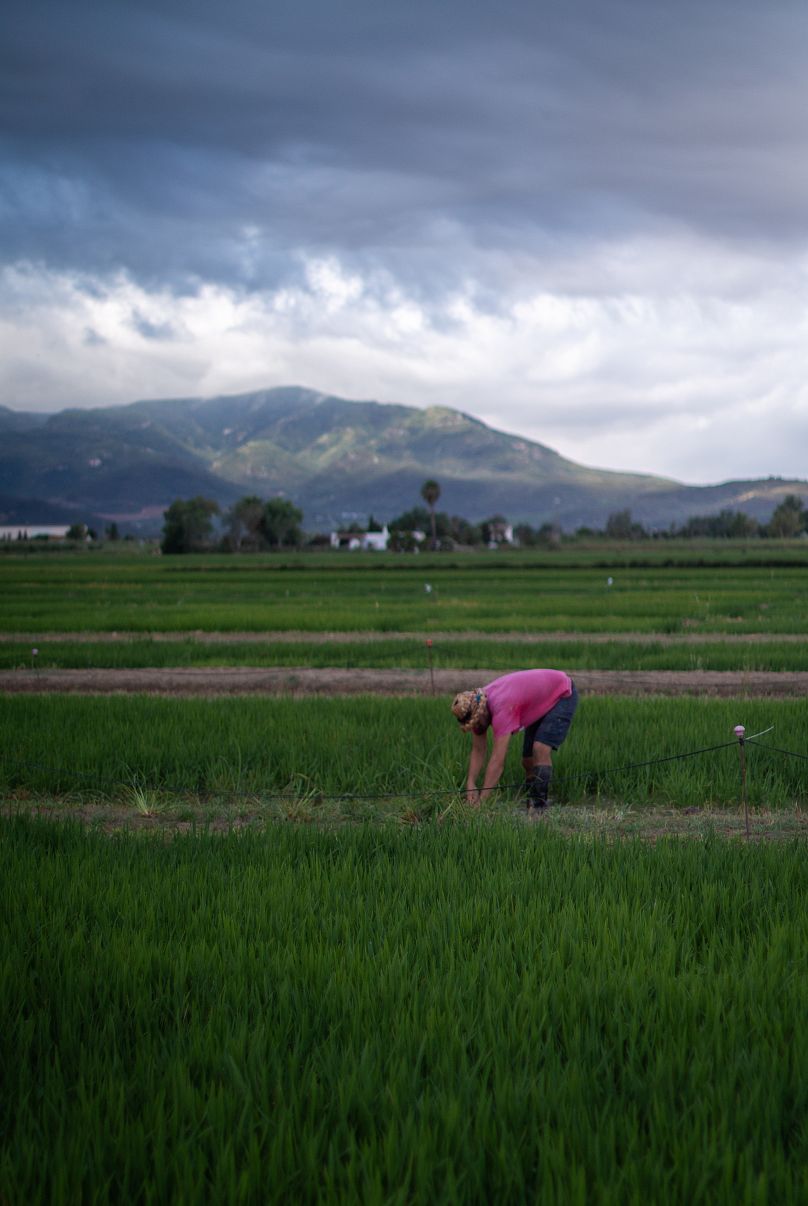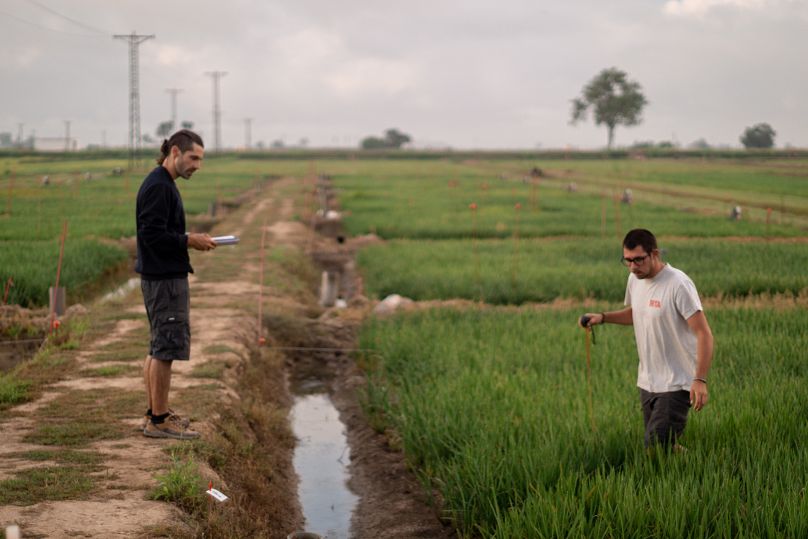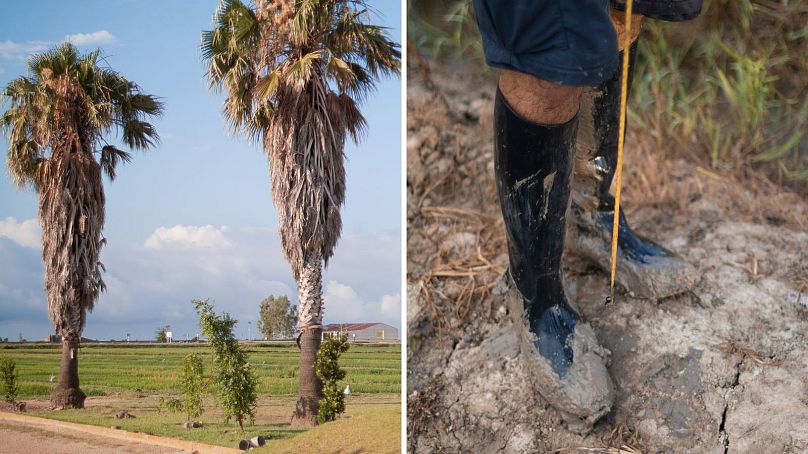In the wetlands of Catalonia, farmers and environmentalists are working together to adapt to the region’s longest drought.
Mosquitoes buzz around the researchers near the banks of the River Ebro as they flood the fields and take readings.
 ADVERTISEMENT
ADVERTISEMENT
 ADVERTISEMENT
ADVERTISEMENT
The smell of sweat and bug repellent mingle in the humidity as the team tests water-saving strategies in the flooded fields at the Institute of Agrifood Research and Technology (IRTA) near Amposta.
The Ebro is Spain’s second longest river - meandering through the north of the country before spilling into the Mediterranean along the Catalonian coast, 200km south of Barcelona.
Here it forms one of Western Europe’s largest wetlands: the Ebro River Delta. It’s not only a habitat for many thousands of species but also serves as a source of hydroelectricity, eco-tourism and - most economically important - rice cultivation.
Drought in Spain, and especially in Catalonia, has seen the Ebro Delta suffer. Water scarcity has caused a 50 per cent cut in the area available for irrigating crops.
All factions of the wetland community - including farmers, hunters, environmentalists - and the Catalonian government are having to cooperate and adapt as a result.
“We need to maintain an equilibrium,” Maria del Mar Catala, an IRTA researcher who has worked in the Delta for 35 years, tells Euronews Green.
“The minds of the farmers are changing, they are adapting. 15 years ago, no one wanted to talk about reducing water, now it’s something that’s happening.”
Why rice matters for Spain
After Italy, Spain is the top producer of rice in Europe, accounting for 30 per cent of the EU’s total production. Its biggest rice producing region was the southern part of the country Andalucia, but shifts in climate have changed that.
In Andalucia's Seville region, the planted area for rice decreased by 53 per cent in 2021, 69 per cent in 2022, and 96 per cent in 2023 compared with the average output of previous years, meaning the once top rice producing region now makes almost nothing. That puts more pressure on the other rice growing areas like the Ebro Delta to continue production, raising the threat to the wetland ecosystem.
“Rice is the most economical commodity on the delta; more stress on rice production in Catalonia therefore means more on the environment,” IRTA researcher Nestor Perez Mendez says. He speaks as an environmentalist, but also as someone who knows that the delta’s economic viability makes it valuable to the government and businesses.
The delta is in a position unthinkable a decade ago as drought has decreased water flow, reducing deposits of sediment that are needed to keep the delta’s elevation above sea level. But Spain’s wetland is a case study for the rest of Europe, showing how commercial and environmental interests can work together in the face of increasingly extreme weather.
The middleman of the wetlands
Funded by Spain’s science ministry, IRTA is conducting research to prepare for this future while uniting the delta’s different factions.
“All farmers know that I defend their interest, and I try to create a synergy between farmers and environmental interests,” says Maria. “All my life I’ve been working with them, they need me, and I need them. The farmers will adapt, they have to.”
The drought in Catalonia has led to water restrictions in the city and the countryside, with water usage for agriculture being cut by 50 per cent. This makes the flooded conditions that rice needs to grow in increasingly difficult to attain.
Providing technical advice to the government and farmers, IRTA’s researchers run experiments in their wetlands facility. These tests include leaving the rice fields unflooded for certain periods, or flooding and draining the rice fields across the growing season. All methods they hope will reduce dependency on mass flooding and save water in times of future drought.
Progress takes time, but the research done today will provide the region with better adaptation to a changing climate in the future. “If people don't study this, then there won't be a pool of alternatives when the moment comes,” says Chilean researcher Seba Leonardo.
A delicate delta, an extreme climate
Worsening droughts aren’t locals' only climate concern.
“This year we have the drought with the regulated water, and the rise in sea level. Maybe it’s not a thing of 10 or 20 years but it’s very near. It will be difficult to grow rice here then,” rice farmer Lluis Jornet says.
Storms in previous years have been almost as worrying as the drought. As the Ebro meets the Mediterranean, sea water can overrun the flooded fields causing salination of the soil. This makes life harder for freshwater species and rice growers.
“The unpredictability of climate is increasing,” Nestor explains. “We can adapt to less water, and provide alternatives to deal with water shortage. The problem is that this year might be dry and next year will be wet and rainy; the Ebro Delta is vulnerable to both.
“For me the worst problems are the unpredictability of climate so we cannot plan a reliable strategy long term.”
A framework for the future
Technology can help us in a world gripped by extreme weather, but not immediately. The IRTA institute is an example of due course and long-term research, laying the ground for critical adaptations.
Spain is on the frontline of climate change in Europe, with 75 per cent of its land battling climatic conditions that could lead to desertification, according to the UN Convention to Combat Desertification.
Other European nations will be looking at how Spain’s environmental and agricultural communities work together to help each other on the local level.
The increased pressure that climate change will put on more northerly parts of the continent requires taking note of the lessons of the delta, before the climate catches us unprepared.













